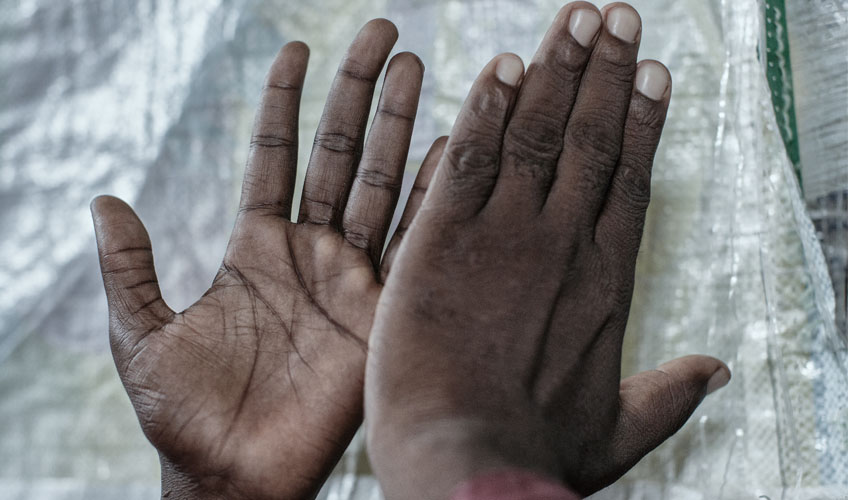Despair and determination in Nigeria: Can we build peace amid humanitarian crises?
As we mark World Humanitarian Day on Saturday 19 August 2017 with the hashtag #NotATarget, I am reminded of how important it is to prioritise the building of peace amid humanitarian crises.

As a peacebuilder in one of the world’s most severe humanitarian crises, I have been struck by the conflicting emotions of both despair and determination. In northeast Nigeria’s Borno state, where I have worked over two years, civilians are caught up in violent conflict every day.
Our sectors, humanitarian and peacebuilding, are not incompatible in theory and design, yet we struggle to break the silos and find collaboration in practice. In complex emergencies like northeast Nigeria, it appears that we have forgotten to align these two sides of the same coin. I believe this is a shame because what is ‘humanitarian’ in nature can and should support ‘peace’ and what is ‘peacebuilding’ in nature can and should support basic human needs and humanitarian recovery efforts. It is this conviction that makes me determined to support the building of peace amid Nigeria’s continuing humanitarian crisis.
But I also feel despair when I think of the sheer magnitude of the humanitarian crisis in northeast Nigeria, which has left so many innocent civilians dead, homeless, unemployed, displaced and under-nourished. The conflict between the Government of Nigeria and the insurgent group Boko Haram has led to the displacement of 2.7 million people in the Lake Chad Basin (Nigeria, Niger, Chad and Cameroon), an area that has long suffered from underdevelopment. In Nigeria, two million people receive emergency food assistance and livelihood support each month. Over five million people are severely food insecure and need emergency aid with near-famine conditions being identified in Borno and Adamawa states.
Listening to women and girls who have survived sexual violence by Boko Haram, one fully understands not only the physical but also the psychological and social destruction that this level of violent conflict creates. In one example, a brother who was the only living relative of his 16-year-old sister struggled to accept and show her love because of the stigma associated with her captivity with Boko Haram. She became re-traumatized due to this stigma and found herself socially and economically destitute, on the margins of the community and unable to reintegrate. Importantly, there are still over 700,000 civilians living in territories that are extremely difficult or inaccessible for humanitarian partners to reach due to continued Boko Haram attacks. The victimisation of these civilians continues.
Equally important is the risk that humanitarians themselves have experienced in their attempts to protect civilians in crisis. In January 2017, the Nigerian Air Force mistakenly bombed an internally displaced person (IDP) camp near that Cameroonian border believing it was a Boko Haram encampment. Six Red Cross aid workers as well as over 200 civilians who were in the camp to seek refuge from violence lost their lives.
The #NotATarget campaign serves as a timely reminder that it is important to protect all civilians caught in conflict, including humanitarian workers.
Humanitarian assistance and peacebuilding can and should be mutually constitutive; however, crises tend to operate according to psychologist Abraham Maslow’s hierarchy of needs, which contends that physiological and safety needs must be met from a humanitarian standpoint before well-being needs can be considered. In this way, humanitarian focus on life-saving needs is prioritised over well-being, thereby marginalising the building of peace. Some examples from northeast Nigeria help illustrate this: Abubakar participated in a workshop on peacebuilding by International Alert in Maiduguri, Borno State, in early 2016. Empowered by the idea that dialogue could help him and his community forge a path forward after violence devastated his society, he advocated for more peacebuilding and more peacebuilders within his community in displacement. But after returning to his Local Government Area from the displacement camp, the lack of basic human needs (housing, food, economic opportunities, safety, etc) challenged his enthusiasm as a peacebuilder. He and his family quickly became emaciated and began fighting for survival. After a few weeks, Abubakar lost his five-year-old son to malnutrition, and stopped participating in peacebuilding activities.
Yet I remain convinced of the need to integrate peacebuilding into humanitarian and development initiatives in northeast Nigeria. International Alert has been working to strengthen social cohesion through community dialogue and support workshops for women and girls with funding from the Embassy of Norway and Embassy of France in partnership with UNICEF and the Borno State Ministry for Women’s Affairs and Development (BMWASD) as well as projects with UK Foreign and Commonwealth Office (FCO)’ s Conflict and Security Team and the Borno State Ministry for Reconstruction, Reintegration and Resettlement. These partnerships have ensured that peace dividends are fostered alongside humanitarian support, so that the most vulnerable civilians receive support for their physical needs, as well as social and psychological support. Through our programming, we have witnessed survivors of sexual and gender-based violence (SGBV) reintegrate into their families and community due to reduced stigma, husbands and wives reunite and reconcile their marital relationship after sexual violence by Boko Haram, and religious leaders facilitate attitudinal and behavioural changes among their community members through peacebuilding dialogues in displacement.
Sadly, the needs are great and the coordination still occurs in an ad hoc manner. But it is extremely important that the co-ordination of emergency responses in northeast Nigeria link humanitarian efforts in the short to medium term and development plans in the long term.The importance of peacebuilding has never been greater, as the deep divisions in Nigerian society can play a role in exacerbating the humanitarian challenges if not addressed properly.
On this World Humanitarian Day, let’s commit ourselves to creating the conditions for humanitarian and peacebuilding solutions to co-exist, complement, collaborate and achieve lasting positive change.



